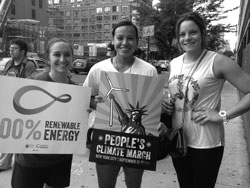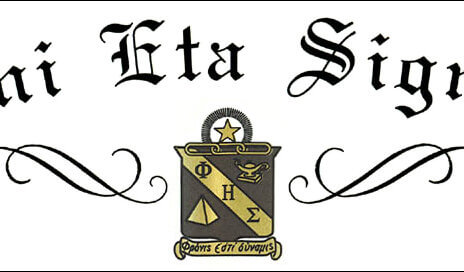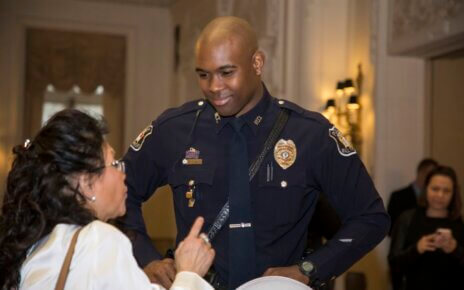Twenty-seven University students and faculty members attended the People’s Climate March on Sunday, Sept. 21 in NYC. The march drew over 300,000 people to the streets of Manhattan, making it the largest climate rally to date.
Protestors marched for various climate concerns including the use of fossil fuels, clean water and global warming.
“I knew [the march] was going to be one of the biggest climate justice events in history. It was a fantastic, inspiring opportunity for the students. I wanted the University to represent the school at the march,” said Dr. Johanna Foster, assistant professor of political science and sociology instructor.
On the morning of the march, members of the University gathered on a bus that was provided and entirely funded by the Honors School. While travelling to Manhattan, students were shown an educational component film about climate change.
Dr. Kevin Dooley, Dean of the Honors School, said, “The Climate Change March allowed students the opportunity to see how peaceful protests can enhance the democratic process… This event allowed our students to see that peaceful protests and demonstrations are part of what it means to be an American and a responsible global citizen.”
Upon arrival, the group gathered at the beginning of the march in Central Park and assembled themselves in the five lines that other Universities around the country had already formed. Foster said, “To have the students amongst thousands of other University students from all over was a thrilling experience.” Foster and the students marched through Midtown, to Columbus Circle, then headed to Times Square and the Far West Side, and finally stopped at 34th street.
Sydney Underhill, a sophomore studying political science and sociology, said, “I walked in the march basically from beginning to end and the best word to describe it is euphoric. It was amazing to be surrounded by so many individuals filled with so much passion and love in regards to climate justice and Mother Earth.”
Foster was approached with the idea of having members of the University attend the People’s Climate March by Molly Greenburg, a University alumnus. “Molly is a community organizer who works on climate issues and she actually helped organize the Climate March,” she said. After her discussion with Greenburg, Foster felt it was imperative for the University to partake in this historical event.
To encourage University participation, Foster informed students in her “Introduction to Social Justice” class of the march, and encouraged them to take action if this topic so motivated them to do so. According to Foster, however, there was a presence from other students across the academic spectrum, with departments such as sociology, political science, social work, science, music industry, criminal justice, and business in attendance.
Foster believes that students can feel empowered by attending marches and surrounding themselves with information on social change and revolutions.
Aside from Foster’s new class on campus, there are other classes being offered to students who want to learn more about social change, including a perspectives course on climate change that is being offered this upcoming spring. Both Dooley and Catherine Duckett, Associate Dean of the School of Science, will be teaching this course and covering basic climate science while also examining the actions of certain lobbyists, political parties, and multinational corporations.
“We will also examine the long term effects of climate change on the biological world and address the question what are the risks associated with long term ecological damages of climate change and are those risks such that a conservative approach is warrantee,” said Duckett.
The People’s Climate March was one of a series of events held around the world two days before the United Nations Climate Summit. On Tuesday, Sept. 23 more than 120 international leaders, business executives and activist groups assembled to conduct a new global climate treaty that will follow the Kyoto Protocol by the end of 2015. The Kyoto Protocol is an international treaty that sets required obligations on manufacturing countries to reduce emissions of greenhouse gases.
According to thinkprogress.org, “While this meeting is not an official U.N. negotiating session, leaders have been invited to announce significant and substantial initiatives to help move the world toward a path that will limit global warming.”
After attending the march, Foster feels inspired to persuade the sociology club to make more of an effort to get involved in more social change activities.
PHOTO COURTESY of Dr. Johanna Foster




